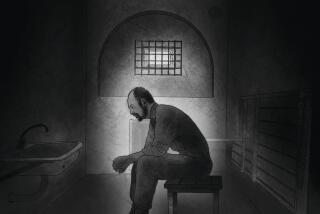U.S. Prison Conditions Worse, Soviets’ Better, Rights Report Finds
- Share via
MOSCOW — Over the past 10 years, conditions in Soviet prisons have improved while those in the United States have gotten worse, the U.S. Helsinki Watch Committee said Thursday after lengthy surveys of superpower jails.
Both countries still have the highest incarceration rates among major nations of the world, with 1 million people each behind bars, Helsinki Watch said in reports published to coincide with a 38-nation human rights conference being held in Moscow.
The human rights monitoring group issued separate reports on the United States and the Soviet Union plus an overview including prison conditions in five other countries belonging to the Conference on Security and Cooperation in Europe (CSCE)--Poland, Czechoslovakia, Turkey, Spain and Britain.
“In most cases, the conditions under which people are confined are very bad. In many cases, they are really intolerable and inhumane,” said Prof. Herman Schwartz of American University Law School, chairman of the Helsinki Watch prison project.
In all seven countries, people awaiting trial are held in conditions that are far worse than those for convicted murderers and rapists, he told a news conference.
“Those awaiting trial are denied the most basic rights--no letters, no visits,” he said. “They just sit in cells for 23 and sometimes 24 hours a day . . . for as long as four years.”
In the Soviet Union, the report said, “prison reforms are being seriously attempted, and changes are evident.”
U.S. attorney Robert Kushen, a Soviet expert who participated in the study of 21 Soviet penal facilities, said the changes in the last 10 years include less physical abuse by prison staff, legal changes so food rations aren’t cut as punishment and new administrators in some facilities.
However, grave problems remain, the report said, including exploitation of prison labor, overcrowding that breeds tuberculosis and harsh climates that result in severe physical deprivation.
Helsinki Watch called on the Soviet Union to amend its laws to encourage release on bail and speedy trials.
In the United States, Schwartz said, conditions are worse than they were 10 years ago because prisoners are being packed into overcrowded facilities and “courts are less sympathetic” to complaints of alleged human rights abuses.
Helsinki Watch said it was distressed by the increasing use of “prisons within prisons,” citing the windowless Q-Wing of the Florida State Prison, where inmates never go outdoors.
It also cited the use of handcuffs as a disciplinary measure at the Broward institution for women in Florida as violating U.N. standards on the treatment of prisoners.
In Poland and Czechoslovakia, Schwartz said, prisons have improved radically during the past two years, and Turkish prisons “have improved somewhat as they moved from military to civilian rule.”
But in Turkey, torture of pretrial detainees is still routine, and physical assaults on convicted prisoners are frequent, he said.
Prisons in Britain and Spain haven’t changed radically, but both governments barred Helsinki Watch from visiting some penal facilities.
The 35-nation CSCE, which groups the United States, Canada and European countries, was set up to implement the 1975 Helsinki Final Act on human rights.
More to Read
Sign up for Essential California
The most important California stories and recommendations in your inbox every morning.
You may occasionally receive promotional content from the Los Angeles Times.













